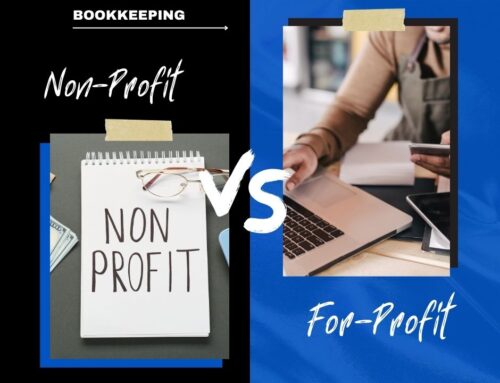The accounting process is comprised of summarizing, analyzing, and reporting financial transactions. It includes the eight-step process for bookkeeping tasks in a small business.
Establishing an accounting process is crucial for maintaining efficiency in your small business bookkeeping department.
Unfortunately, many small business owners that I consult with lack proper organization in their accounting and finance departments. It may not seem like a problem now, but these inefficiencies can create major issues down the road.
The accounting process will ultimately make things easier for small business owners. It’s designed to make bookkeeping tasks and financial decision making less complicated.
These are some of the top reasons why it’s so essential for every small business bookkeeping department to implement an accounting process.
Accounts Payable Management
If small business bookkeeping tasks aren’t completed at a specific day or time each accounting cycle, it’s easier for things to get lost in the shuffle.
When do you pay your bills? How often do you pay your bills? Who pays your bills?
Without a well-defined accounting process, invoices and other payables will get overlooked.
Failure to pay debts can damage your company’s reputation. Venders and suppliers may stop working with you altogether if they’re not getting paid on time. Suppliers might lower your credit limit and stop giving you preferred rates as well.
Mismanaging your payables is a fast way to incur unnecessary late fees or other penalties.
Complex accounts payables need to be managed carefully. You’ll need to keep a close eye on your reconciliations and integrate those numbers with your profit and loss statements. Otherwise, your financial data will not be accurate.
Accounts Receivable Management
Your small business accounting structure not only controls outgoing expenses, but it also ensures that money continues to flow into the business.
When do you bill clients? How do you send invoices? Who is responsible for following up with unpaid receivables?
All this needs to be established in your accounting process.
Sometimes the billing structure will vary from client to client. Some customers might pay-in-full upfront, others get billed weekly, and some get invoiced once per month. For larger projects, you might send an invoice throughout different stages of the job.
The more complicated the billing structure, the more important it is to have proper management of your receivables.
Failure to stay on top of your accounts receivables can cause serious cash flow problems. If clients aren’t being held accountable for paying on time, it could create a long-term pattern for late or missed payments.
On the other hand, proper management of receivables will help ensure strong cash flow and higher bank balances.
Financial Analysis
When you establish an efficient small business bookkeeping process, you’ll always have an accurate representation of your company’s financial health.
The accounting cycle ends with closing entries each month, year, or quarter, depending on how you have it set up. At a minimum, I’d recommend closing entries each quarter.
During this time, your small business bookkeeper will create an income statement, cash flow statement, and update your balance sheet.
Without these reports, you would have no way of knowing how your business is doing from a financial standpoint. Sure, the storefront might seem busy with customers, but that alone won’t tell you if the business is profitable.
Financial analysis allows you to compare your numbers to previous accounting periods as well.
Every small business needs to establish bookkeeping KPIs. Those KPIs will almost always be measured against the balance sheet. But if the balance sheet isn’t updated, it’s impossible to know how you’re doing. A small business CFO can help you establish KPIs and analyze your financial statements.
Fraud
Fraud has become a significant problem for small business owners. According to a recent study, the median fraud loss for small businesses is $200,000.
Lack of internal controls accounts for 42% of small business fraud cases.
The report also found that data monitoring, analysis, and audits caused the biggest reductions in fraudulent activity.
In short, failure to implement an accounting process increases the chances of small business fraud. While it won’t eliminate the possibility of fraud cases altogether, it will increase your chances of detecting things early.
Set up internal bookkeeping controls. Segregate different accounting duties, so one person isn’t responsible for your entire bookkeeping process.
Tax Preparation
Lots of small businesses struggle to meet their tax obligations. Tax management should never be an issue, but tax demands can come as a surprise without a proper accounting process.
If you’re just looking at sales or revenue numbers without considering the tax implications, it can be detrimental come tax season.
Successful small businesses have internal bookkeeping controls to plan for taxes. This includes payroll tax payments and quarterly estimate filings.
Another problem small business owners have is waiting until February or March to start organizing the prior year’s financial information. Trying to organize an entire year of transactions and statements a month before your taxes need to be filed is a big mistake.
The books need to be organized throughout the year. Once tax season comes around, filing your taxes will be as simple as turning those financial statements over to your accountant.
Forecasting and Planning
Small business owners must always be looking toward the future.
Establishing an accounting process is the best way to forecast cash flow accurately. Otherwise, you won’t be able to make crucial business decisions.
For example, let’s say you’re thinking about expanding, buying a building, hiring new employees, or purchasing an expensive piece of equipment.
How can you make this decision without looking at your finances?
This goes beyond looking at the financial health of your organization today. You’ll need to make sure you can cover these expenses 12, 24, or 36 months down the road.
Forecasting, budgeting, and cash flow management are all commonly outsourced CFO services. So, if you’re struggling to manage these tasks on your own, you should consider using a third-party resource.
Conclusion
Every business, including small businesses, need to establish an accounting process.
Failure to do so can create significant problems for your company in the short-term, as well as the long-term.
For those of you who have not implemented an accounting system or don’t know where to start, consider using an outsourced bookkeeping service. An outsourced bookkeeper or interim CFO can handle all the accounting cycle tasks for you.





